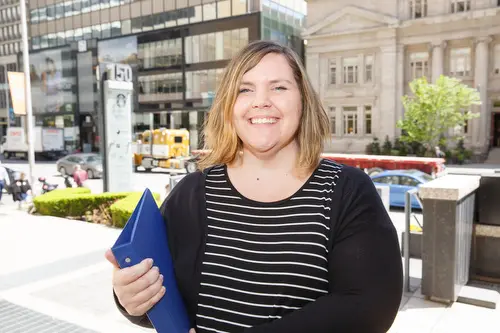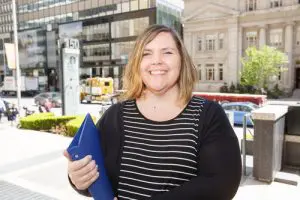
By Stuart Mann
Angie Hocking does a lot of things at Redeemer, Bloor St., but her next task may be her most unusual yet.
Ms. Hocking, who is Redeemer’s director of outreach services, will be teaching staff at a local bank how to be more compassionate and helpful to people who are homeless or struggling with mental health issues.
The 90-minute workshop on “compassion training,” as she calls it, will be held at the bank at the end of May.

It’s the first time she will be providing the training to a business and she’s excited by the possibilities. Other local establishments have expressed interest in the workshop as well, including a coffee shop and the security team at an office tower.
“It’s new and I don’t know where it will go but I think it’s a beautiful and important way to be present,” she says. “In the end, the goal is to teach that we are all human beings and we all deserve respect. That’s what we’re called to do as Christians, and if we emulate that and teach that, it’s a powerful witness and way to ensure that the gospel is being lived out.”
Ms. Hocking says there are a lot of homeless and marginalized people who live or spend their days in the area around Redeemer, located at the corner of Bloor Street and Avenue Road in downtown Toronto. Some of them go into banks and other businesses and buildings for a variety of reasons – to sit down, to sleep, to get out of the cold, to ask for food or money – and the staff are unprepared to help them. Security guards are often called on to eject them from the premises.
After one such incident at a local bank, Ms. Hocking spoke to the manager, to see if there was anything she could do. The manager explained that her staff were often scared and didn’t know how to respond when a homeless or marginalized person entered the building and wanted to be served.
“The staff are doing their jobs as best they can but they don’t know what to do when that happens and they’re not aware of any resources in the neighbourhood that can help,” says Ms. Hocking.
Out of that conversation, she came up with the idea of providing compassion training. Her workshop consists of three parts. First, she hopes to build empathy by showing the sorts of challenges and barriers that homeless and marginalized people deal with every day. Second, she will teach de-escalation tactics and how to engage with the person instead of immediately calling security. Third, she will focus on resources that are available in the vicinity, including Redeemer’s outreach program, called The Common Table, which provides meals, counselling and activities.
She says trained staff could make a big difference in the lives of homeless and marginalized people. “If we can train people and places to be compassionate, engaging and human – that’s a great outcome. If people are treated well, they might access a service that takes them to the next level of stability.”
She says providing the training to local businesses is a practical way for the Church to be a witness in the neighbourhood. “I think it’s really exciting. How often do you hear of a church teaching a bank? It’s such a great way to be present with our neighbours.”
The workshop might also change people’s impression of the Church, she says. “Sometimes churches that do large outreach can be seen as a sore spot in the neighbourhood, like they’re dragging in the riff-raff, but in fact those places are alleviating a lot of the issues that would otherwise be on the street. This is another way of showing that we are a strong, positive presence. We are an asset to our communities, and we have a lot of skill that benefits the businesses in the neighbourhood.”
She says the bank that is holding her workshop at the end of May doesn’t have a problem with the fact that she comes from a church. “Sometimes I think that’s more of a Church worry than an outside worry. Sometimes we make a big deal of that, but if we just be us and do the work, I think we’d be surprised at how welcome the world is for us to be present.”